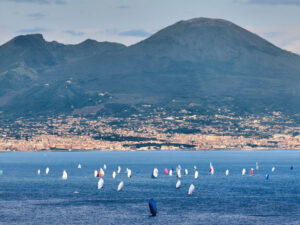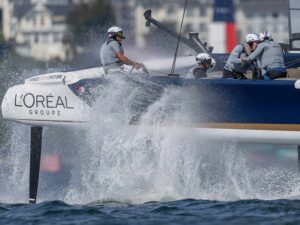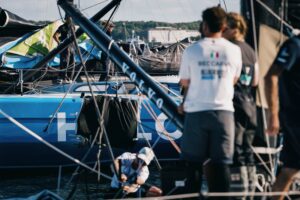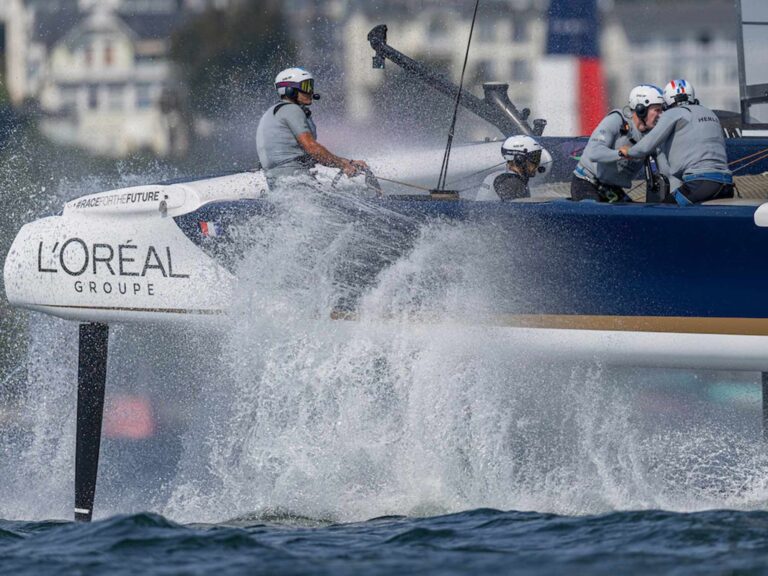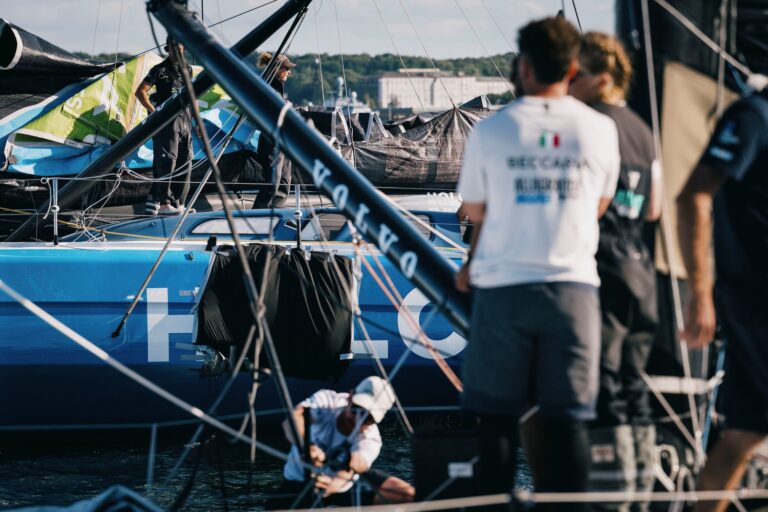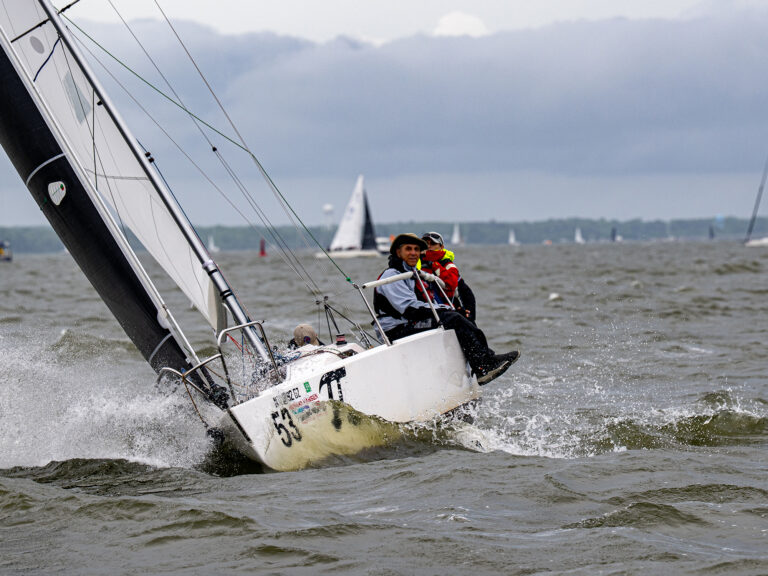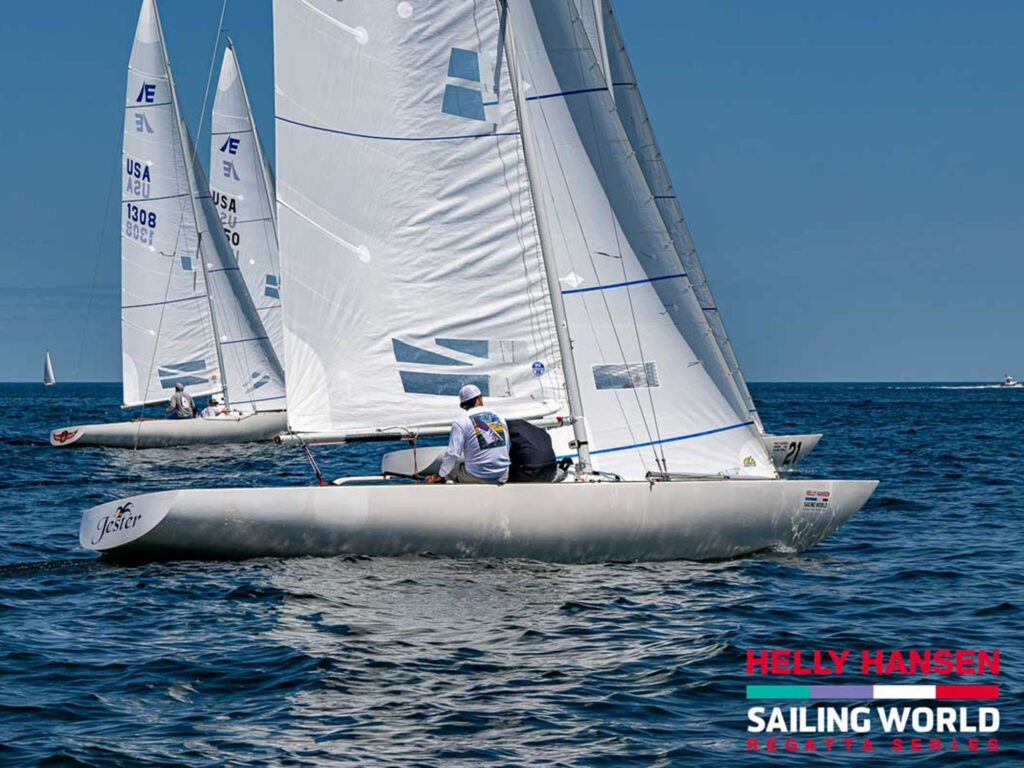
Online travel experts have it wrong when it comes to Marblehead. Predictable lists of “Things to Do” are the same old tourism flap: Saunter through historic homes and winding one-way streets, pop into a boutique. Get a cookie at the Muffin Shop. Take a walk out to Fort Sewall. Catch a sunrise at Chandler Hovey Park and Marblehead Lighthouse.
Of course, one could also book a fishing charter to catch some “striphahs,” get spooked in nearby Salem or sauced on pint-sized drinks at Maddie’s Sail Loft. And while those are all fine and good, there’s one glaring omission on the summer to-do list: “Watch the sailboat races and drink rum with the thirsty sailors of Marblehead Race Week, one of America’s longest running hometown regattas.”
Sailing and drinking are what local and visiting teams will be doing this week as the final stop of the Helly Hansen Sailing World Regatta Series at Marblehead Race Week returns on Thursday, starting with the iconic and classy International One-Design keelboats and the spunky and classic Rhodes 19s.
Come Friday, Saturday and Sunday, the waters off the aforementioned Hovey Park will then be teaming with one-design classes of many shapes and sizes—from the diminutive Town Class classics to the sporty Viper 640s. From the little ILCAs to the big J/105s. And with the newer-school J/70s alongside the old-school International 110s, one thing’s for sure, Marblehead’s racing scene will be at its peak.

Boston Yacht Club, founded in 1866 and serving as the welcome mat on the town side of Marblehead Harbor, serves as proud host of this storied event. As per Race Week tradition, Boston’s neighbors over on the Neck—Eastern and Corinthian yacht clubs—share hosting in alternating years. All clubs collaborate on the running of races, but it’s Boston’s turn to host the post-race parties this year.
The Etchells Bump is Real
Launching from the hoists at Boston and other clubs each race day will be the regatta’s long and slim Etchells class sloops. Once left for dead in Marblehead, the class is enjoying a local resurgence, which local sailing Hall of Famer Jud Smith says has been a long time coming.
“The class has transformed,” Smith says, reflecting on the growing strength of the Etchells fleet at this regatta and in Marblehead itself. “Eight years ago, the class came to me and asked what can we do to save the class in Marblehead,” he says. “I said, ‘it’s going to be really easy: You have to host regattas and just do it on a consistent basis.’ One-design classes are all about regattas and people get excited about them, especially when they’re local, and they’re somewhat repeatable and get traction. Anybody who’s got a decent boat is going show up do this regatta.”
The resurrection of the Etchells class in Marblehead is largely attributed to the dedicated efforts of Tomas Hornos and a few passionate locals who have worked tirelessly to rejuvenate the fleet. Hornos, a champion sailor who works at Smith’s Doyle Sails loft in Salem, plays a pivotal role in this effort by securing older boats, many of which have lately come from the once-thriving fleet in Annapolis. Many of these boats are sent to Florida, where Ezra Culver and his team at EZ Marine work their magic, giving them a new lease on life before returning north.

Hornos’ dedication goes beyond merely getting older boats up to speed; he actively opens doors for new sailors to join the fleet by making the boats accessible. “We take active measures to ensure these boats remain in top condition,” Smith says, “which makes the class both approachable and enticing.”
For Smith, it’s also deeply personal. After his daughter Lindsey faced a long and challenging recovery from a traumatic life-threatening injury, Smith saw an opportunity to keep her Etchells sailing team Fast Mermaid on the racecourse by maintaining the boat for her and keeping it active in the fleet. “Instead of just letting the whole thing just die, I just thought it was the right thing to keep that whole program going,” he says, “with the idea that we’re going to get back and, you know, get back to full strength.”
International 110s Join the Party
Another return to the Race Week scene that Smith is excited to have is the International 110 class, which is now vibrant in Northeast and West Coast. “The 110 is a great boat with a lot of character,” he says, harking back to the days when he and his wife Cindy sailed one together before they were married. The boat holds a special place for Smith, not just for its nostalgic value, but because of its enduring appeal and affordability.

“I remember buying my 110 for $1,000. And if I was to fix it up and sell it today, I could still get a $1,000 for it,” says Smith, highlighting the boat’s lasting value and cult following. This affordability, combined with the boat’s vibrant and colorful aesthetics, makes it standout on the water. “It’s nice to see that they’ve got a good fleet down on the South Shore,” he notes, adding that this resurgence is a testament to its continued relevance and the passionate sailors who keep its legacy alive.
The Enduring Rhodes 19 the Race Week Regular
The Rhodes 19 class, always one of the largest at the regatta, remains a steadfast part of Marblehead’s vibrant sailing scene, admired for its enduring appeal and competitive racing. The class has enjoyed consistency in numbers at Race Week and remains attractive for young families and local sailors, drawn to its smaller scale and the close community it fosters. Despite the challenges of balancing family commitments with busy racing schedules, these sailors are particularly motivated as Race Week will serve as a key regatta for the upcoming Rhodes 19 Nationals in Marblehead.
The community aspect of Marblehead’s sailing scene is as significant as the competition itself. While Helly Hansen Sailing World Regatta Series events are renowned for their unrivaled post-racing social experiences, the Marblehead stop of the series has a uniquely local flair with most fleets hosting house parties and lively socials on Thursday night. These gatherings foster connections between sailors of all ages and experience levels.

While there are old-timers and old-time perpetual trophies at Race Week, these days there’s an undeniable generational shift and that’s because of the accessibility of Marblehead Race Week in particular, Smith says. “The problem up here is access to the water,” he says. “The yacht clubs cooperate to help have these boats sailing, and that’s a good thing.”
Through boat donations, mentorship, and an emphasis on fleet-building, the regatta has managed to attract younger sailors and diverse teams, ensuring its vitality for years to come. And, unlike many other regattas, Marblehead Race Week thrives during the summer, making it a standout event on the sailing calendar. As Smith points out, Marblehead’s choice long ago to host this regatta in the heart of summer is unique.
“Most clubs like to have something else going on in the summer, or like to have the club available for their membership,” he says. But Race Week’s scheduling allows Marblehead to showcase not only its beautiful sailing conditions but also its vibrant community, its stunning coastal scenery, and most importantly its hospitality.

So, while tourists sticking to their Tripadvisor must-do list may be content with their cookies from the Muffin Shop and sunrise views from Marblehead Lighthouse, those in the know will be watching the spectacular sailing of the Helly Hansen Sailing World Regatta Series at Marblehead Race Week and catching the sunset buzz at Boston YC.

